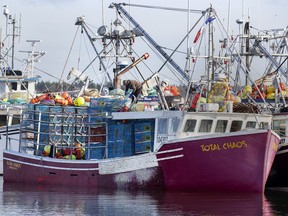As Trump takes office, Atlantic Canadian seafood companies are looking to diversify the export market

Article content
HALIFAX – Representatives of the seafood industry in Atlantic Canada are urging harvesters and exporters to diversify their markets with US President Donald Trump back at the White House.
Article content
Article content
As Trump was sworn in on Monday, his team signaled that he was standing by his threat to impose a 25 percent tariff on Canadian goods on his first day in office.
Advertisement 2
Article content
But Geoff Irvine, director of the Lobster Council of Canada, said in an interview that the new U.S. administration is sending a message that Canada’s seafood industry should shift its focus to other global markets.
“The priority is to develop our trade in other areas,” Irvine said Monday. “That’s my message to anyone who will listen. We have to build resilience in our business by selling more in different areas. “
He says that by 2023, Quebec and Atlantic Canada have combined to export $1.6 billion worth of lobsters to the United States, adding that if tariffs are imposed, it will cost important jobs and income to all coastal communities.
Representatives of Canada’s seafood industry are heading to a trade show in Europe in two weeks, but Irvine said the industry could do more to develop markets in Asia and the Middle East.
Stewart Lamont, managing director of the Tangier Lobster Company, based in Tangier, NS, expressed hope Monday that Trump’s tariff plan is now “very high in the air,” as there is consumer awareness that tariffs could mean higher prices for Americans for food and nutrition. fat.
Article content
Advertisement 3
Article content
Lamont – whose company sells live lobsters within Canada as well as to customers in Europe, Asia and the Middle East – said he has chosen over the years to focus on customers outside the United States. “Diversify as much as possible to reduce your risk in the short term,” he said in an interview.
However, Lamont notes that the seafood sector on Canada’s east coast is closely linked to the US industry, with some fish caught crossing the border multiple times, and processors and exporters sometimes owning operations in both countries.
Osborne Burke, manager of Victoria Co-operative Fisheries Ltd. in Neils Harbour, NS, said he believes a tariff on seafood will not be attractive to American consumers, who will see higher prices. “Do we have anything to worry about, yes. But they should be very worried,” he said in an interview on Monday.
Like Lamont, Burke is looking to diversify his customers. Last year, his cooperative – which works with about 100 harvesters in Cape Breton – could have sold more crab and lobster to Southeast Asia but chose to continue selling to American customers. “Because of the threat of these costs … we are looking to sell more to our Asian customers,” he said.
Advertisement 4
Article content
For David DiCenso – the manager of Boston Wholesale Lobster – the possibility of a tax on the crustaceans he imports from Canada is a threat to his business, and he hopes that Trump will stop his threat.
“We only do a 10 percent limit, and there’s no way you can pay a 25 percent tax on that, and there’s no way you can pass that on to the harvesters,” DiCenso said in an interview Monday in Boston.
Robert Huisch, a professor in the international development studies department at Dalhousie University, advised Atlantic Canadian businesses to remain vigilant over the next four years regarding the US tax risk.
American consumers’ anger at the high prices of seafood at supermarkets and restaurants will not be a deciding factor in the US tariff decision.
Huisch said Canadian governments should unite in imposing more tariffs on energy exports as a way of retaliating against tariffs found in other countries.
“Americans don’t rely on snow crab or other seafood in the same way that they rely on energy, and I think that will be a strong card in any negotiations between Canada and the US,” he said.
This Canadian Press report was first published on January 20, 2025.
– Via files from the Associated Press.
Article content
Source link


